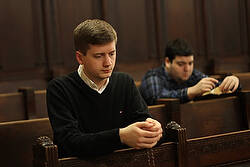To be a teacher is to be constantly thinking about the future. We think about where we are heading with our lesson plans, the date for the next test, the responsibility of preparing students for the next English class or the higher math class, or for a college or career. And in that preparation, in that anticipation of the future, we encourage students to find a passion, to detect some desire that allows them to make a living and experience daily joy. We encourage them to find a vocation.
My trouble, lately, is with the word we choose to talk about vocation, with "find." This implies a completeness, a stopping point. If I find something, I no longer have to search for it. I no longer have to ask about it or wonder about it. It's there; it's with me; it's . . . found. And once something is found, what is left?
For a long time, I relied upon the language of finding. I have to find it, I would say, and I proceeded as if finding a vocation was like playing hide and seek. I find it, and the game is over. I find it, I would think to myself, and a lot of questions and confusion would clear up. It would be lovely and obvious: here is what you will do for the rest of your life. Here is what will bring you money and happiness and a sense of completeness.
Vocation, I've realized, is a much more fluid thing. Discovering a vocation is to discover what I want to spend the rest of my life trying to be good at. Discovering my vocation is to discover that which I will never truly find, the thing that will continue to fascinate me, continue to haunt me, continue to challenge me, continue to invite me to further sacrifice, further joy, further darkness, further mystery. My vocation, or vocations, will demand more from me than I thought I could give, and because of this, my vocation will be the source of the energy and creativity I give to the world.
Vocation is not an arrival, but a departure. It is not a finishing, but a beginning.








